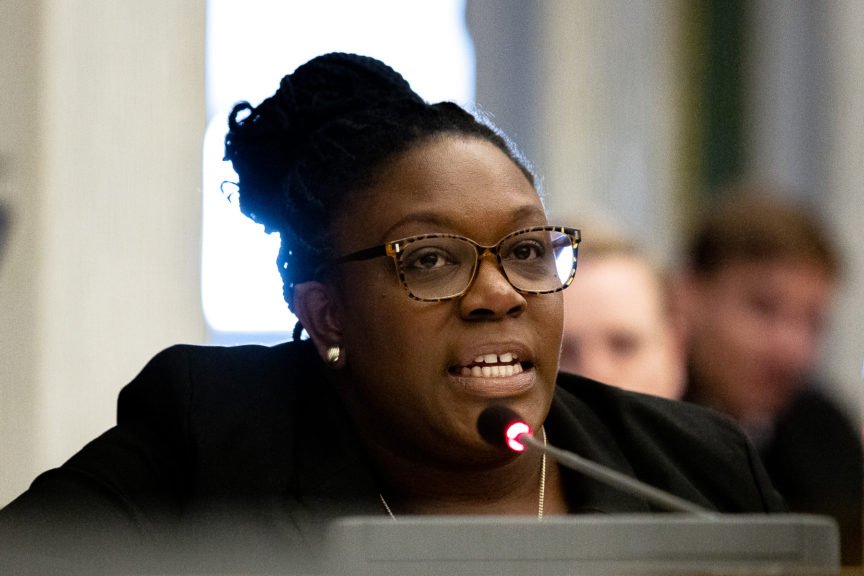$3 million in additional funding would provide increased access to around-the-clock mental health services
PHILADELPHIA, June 1, 2023 – This morning, Councilmember Kendra Brooks (At-Large) gathered with mental health professionals, advocates, and fellow Councilmembers to call for an additional $3 million to fund mobile crisis units in Philadelphia. The City currently has four mobile crisis units that respond when residents are in need of immediate mental health services. Due to staffing shortages, only two of the four mobile crisis teams are able to operate 24/7, and the average wait time exceeds an hour. Additional funding would be used to attract and retain staff and reduce wait times to meet the high demand for mental health services.
“Families all over the city are reaching out for help, and we need to make sure that we have the capacity to respond in a timely manner,” said Councilmember Brooks. “By fully funding mobile crisis units, we are supporting our hardworking mental health providers, and also recognizing that not all crises need to be handled by police. Mobile crisis units help us get specialized help to the families and residents who need it most, so that police officers can focus on solving crimes.”
Mobile Crisis Units, also known as Community Mobile Crisis Response Teams (CMCRTs), respond when calls to mental health hotlines cannot be resolved over the phone. Currently, over 200 Philadelphians make calls each day seeking mental health support, either by calling the local suicide hotline (215-686-4420) or the federal hotline (988) that launched last July. Mobile Crisis Units are also sometimes dispatched as a result of calls to 911.
“This is a crisis,” said Councilmember Mark Squilla (1st District). “We have 988 and people can make calls when they’re in need. But if we don’t have the resources to go out and meet them, to go out and work with them, to go out and address their needs, then we’re not going to be able to help them. It is imperative to make all resources available to Philadelphians who find themselves in a mental health crisis.”
“We don’t send a paramedic to fight a fire, and we shouldn’t send cops to deal with a mental health crisis,” said Councilmember Jamie Gauthier (3rd District). “I am proud that City Council has come together over the past several years to bolster Philly’s mental health crisis response services. We need to build on this work by giving Community Mobile Crisis Response Teams the budget they need to respond to mental health emergencies quickly, no matter when or where they occur. As with all first responders, this is a life-or-death issue.”
“Community Mobile Crisis Response Teams are not a luxury or some special city amenity, but a necessity,” said Councilmember Sharon Vaughn (At-Large). “The dire state of our city, including the shortage of emergency responders, the gun violence epidemic and the toll it’s having on Black and Brown communities, only underscores the need for such resources.”
Community Mobile Crisis Response Teams consist of three trained providers, including a peer support specialist (an individual with lived experiences using crisis response services), a licensed mental health clinician, and a medical professional. Low pay for these positions has contributed to understaffing and long wait times.
“Right now, our mobile crisis units are not fully staffed 24/7, and the waiting times to receive care are unconscionable,” said Dr. Jessica Joseph, a psychologist and member of the Treatment not Trauma Coalition. “I should be able to assure my clients that compassionate and appropriate help is on the way.”
“The police don’t want to be mental health practitioners,” said Rue Landau, Democratic nominee for City Council. “They want to do their jobs. I used to run the City’s Commission on Human Relations, and I saw for years and years that mental health issues were falling through the cracks, that we didn’t have the proper trained professionals at the scene to handle a mental health crisis before it escalated.”
“Mental and behavioral health issues can impact any one of us,” said Nikki Grant, Policy Director at Amistad Law Center, which is part of the Treatment not Trauma Coalition. “Imagine that it’s your child that has a sudden, frightening break with reality. Imagine it’s your friend who is experiencing suicidal ideation. Imagine it’s your parent who has begun behaving erratically, unsafely after a scary diagnosis. Who do you want showing up at the door if you call for help?”
“Our society is grappling with an unprecedented level of trauma and loss,” said Ismael Jimenez, an educator with the Philadelphia Black History Collective. “Our students, our neighbors, and even our own families are burdened by the weight of mental health challenges. It is imperative that we rise to meet this crisis head-on, and mobile crisis units offer a beacon of light in these dark times.”
The Treatment Not Trauma Coalition is a group of social workers, mental health providers, community leaders, and concerned neighbors that advocate for non-police responses to mental health crises. The coalition formed in 2020 after Walter Wallace Jr., a Black man in West Philadelphia, was shot and killed by police during a mental health crisis after a family member called 911 for assistance.
###
Contact: Kathleen Melville | [email protected] | (267) 255-1943


